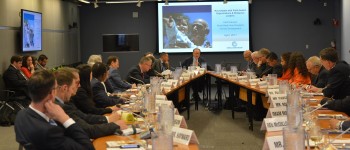
On April 18, 2017, John Nduna, General Secretary of the ACT Alliance, took part in a round table convened by the World Bank in Washington, DC, along with senior staff from sixteen other faith based organizations to discuss with the president of the bank the progress that is being made on poverty eradication, and the link between that work and the Sustainable Development Goals. ACT, along with organizations including the World Council of Churches, the Holy See, Bread for the World, American Jewish World Service, the Aga Khan Foundation USA, Islamic Relief USA, World Vision, spoke about the refugee and migrant crisis and about work to support children in international development and humanitarian work.
Nduna highlighted a new programme ACT has begun in this year, accompanying and raising up the voices of migrant and displaced people, and focusing on a rights-based approach in programme and advocacy work to ensure displaced people have enhanced access to rights and protection.
Dr Jim Yong Kim, president of the World Bank, spoke of importance of faith based organizations as key players in in ending extreme poverty in the world, working in partnerships with other multilateral and bilateral institutions like the World Bank, and also with the private sector, which has trillions of dollars that could be mobilized to meet the aspirations of people around the world.
Speaking as part of a panel on the role of faith inspired actors in ending extreme poverty and advancing the SDGs the next day, Nduna drew links between climate change and humanitarian situations and displacements. “ACT Alliance believes that true resilience requires a comprehensive, integrated approach that combines Disaster Risk Reduction, climate change adaptation and sustainable development within a framework that addresses social, economic and other forms of inequalities between individuals, communities and states,” Nduna said.
He drew examples from ACT members’ ongoing work in the Horn of Africa, responding to the continuing drought there. “In the face of drought in Somalia, ACT is working practically to save lives with water and food, school nutrition programmes and hygiene facilities. But this work is set within a much longer term development programme, and is also engaging in rehabilitation of boreholes, livestock and livelihood interventions and cash transfers where people have depleted all their assets – activities aimed at promoting early recovery and equipping people better to withstand new shocks and setbacks.”
Faith-based organizations like ACT have a particular role to play in addressing climate change, the eradication of poverty and the other SDGs. “Our religious convictions, social codes and customs tell us about concern for the vulnerable: climate change is leading to unprecedented ecological degradation, affecting in particular the lives and livelihoods of the most vulnerable populations. It is an irrefutable moral duty for all governments to agree on concrete and measurable steps towards
global climate justice and partnerships for climate resilience, as a critical component to achieving the the SDGs and bringing in a transformed world – the world we want,” Nduna concluded.
